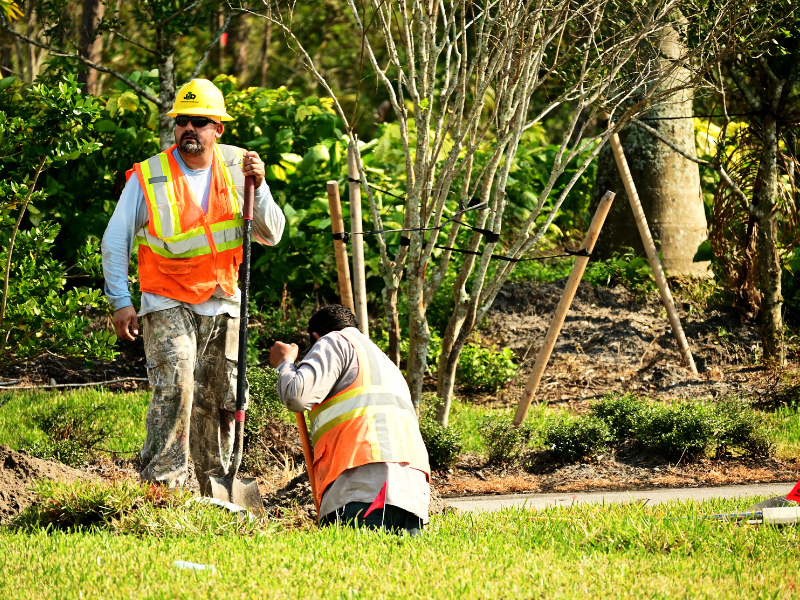What Are The Florida Workers Compensation Rules For Employers?
Employers operating in Florida need to provide workers’ compensation insurance for their staff. The amount and type of coverage is contingent on the industry, number of employees and entity organization – determining these requirements are easy with information from the Bureau of Compliance!
Workers’ compensation insurance is essentially a safety net that employers or businesses put in place to cover benefits for any injuries employees might sustain while carrying out job-related duties—though there are a few exceptions to note. In the sunny state of Florida, it’s not optional, but a legal requirement for the majority of employers to have this kind of coverage. When carrying a workers’ compensation policy, employees can breathe easy knowing they’ll be compensated for any injuries they pick up on the job, no matter who’s at fault, shielding employers from facing major legal actions as a result of a workplace injury.
If you’re an employee in Florida, it’s important to understand your rights and obligations under the state’s workers’ compensation law (FWCL).
Everyone with a work-related injury is entitled to certain no-fault insurance benefits – including salary replacement and medical expenses.
The FWCL regularly audits employers across the state to guarantee that these programs are being provided. If for any reason you believe this isn’t happening at your workplace, our attorneys can help explore legal options available.
Companies that hire a minimum of six regular employees and have twelve seasonal workers who work for more than 30 days but no longer than 45 within the same calendar year must acquire workers’ compensation coverage.
Out-of-state employers need to ensure their insurance provider is aware they are conducting business in Florida!
Workers’ Comp Requirements For the Construction Industry
Business owners and corporate officers alike must take the necessary steps to ensure their employees are properly protected.
When it comes to workers’ compensation, employers of one or more individuals – including themselves if they’re a Limited Liability Company (LLC) member/corporate officer – should familiarize themselves with 69L-6.021 Florida Administrative Code which lists all trades considered part of the construction industry requiring coverage.
For any project to be completed, contractors must check that all sub-contractors hold the necessary Workers’ Compensation Insurance – failure to do so leaves them liable for injuries, illnesses or fatalities of their workers.
For a list of relevant documentation requirements as outlined in Florida Administrative Code 69L-6.032.
When workers are employed by a sub-contractor, they may not be protected in the case of an injury. In such circumstances, if something unfortunate were to happen on the job site, responsibility for paying benefits falls onto the contractor – resulting in potentially costly consequences.
Workers Comp Requirements for the Non-Construction Industry
All businesses that employ four or more individuals, including business owners and officers of LLCs, are legally required to invest in Workers’ Compensation Insurance.
However exceptions exist for non-construction industry Sole Proprietors and Partnerships who can choose whether they want coverage by filing the appropriate form with their local Division of Workers’ Compensation.
What Injuries Are NOT Covered By Workers' Comp?
It’s important to know what instances are not covered by workers’ compensation.
Generally speaking, any injury or illness that is intentionally self-inflicted or caused by illegal activity won’t be eligible for coverage.
The same is true if the injury has been sustained while engaging in prohibited activity, or if it happened while someone was under the influence of drugs or alcohol.
Injuries that come about as a result of horseplay, hostilities between employees, and altercations with non-employees are also not typically covered by workers’ comp either.
Lastly, those that happen away from work, unless the employee was expected to do their job offsite, will rarely qualify. Thankfully, there’s plenty of information available online to help you determine if your particular situation will be eligible for workers’ comp so you can make an informed decision on what steps to take next.
What is The Minimum Payroll for Workers Compensation in Florida?
In Florida, workers compensation is a form of insurance that covers medical expenses and partial wage replacement if an employee gets injured or becomes ill in the workplace.
Florida employers must adhere to a maximum weekly compensation rate for any employee who suffers from an occupational injury or illness.
To stay compliant with the state law (440.12(2) of the Florida Statutes), this amount is set at 100% of the average wage across all industries statewide, conveniently rounded off to the nearest dollar!
How Long Does an Employer Have to Report a Workers Comp Claim in Florida?
If you’ve suffered an injury at work, it’s critical to report the incident within seven (7) days of your employer learning about it.
Doing so in a timely manner ensures that any claims made will be approved – if reported beyond thirty (30) days, they may not qualify for coverage!
Can an Employer Fire You While on Workers Comp in Florida?
In Florida, employers typically have the power to end an employee’s contract without warning. However, workers are protected if they choose to pursue their right for compensation due by filing a claim; no employer is allowed terminate them as retribution.
Under What Circumstances is an Employer is Not Liable to Pay Compensation to The Workers?
Have you ever wondered when employers are exempt from providing worker compensation? Knowing the circumstances in which businesses do not have to give out such payments can help both employees and their supervisors understand what is required of them.
Employers have some exemptions when it comes to providing compensation for an injury sustained by their employees – such as if the employee is not disabled or incapacitated in any way beyond 3 days, and/or the incident was caused through drug and alcohol consumption.
What is Not Considered a Work Related Injury?
If an injury or illness arises in the workplace, it may not necessarily be considered work-related and therefore would fall outside of recordable situations.
Certain exceptions can apply if certain criteria are met.
Protecting employee safety is essential, however there are certain criteria that do not require you to record injuries and illnesses. The following are examples:
1- An employee recently experienced an injury or illness while present in the work environment not as a staff member, but instead simply as part of the general public.
2- At the time of the injury or illness, the employee was present in the work environment as a member of the general public rather than as an employee.
3- Work-related injuries and illnesses are often the result of an event or exposure during work hours, but sometimes they can originate from a different source. Signs and symptoms may appear in the workplace even if their cause is external to it.
4- Participating in a wide variety of activities such as blood donation, physicals and flu shots can be great for your wellbeing – but sometimes these voluntary programs may lead to an injury or illness. From exercise classes and racquetball to baseball games; make sure you take the necessary precautions before joining any recreational activity!
5- Employees’ personal pursuits that occur outside of their job duties may result in unexpected injuries or illnesses while they are on the premises. Employers must take extra precautions to ensure safety, regardless of the time spent at work.
6- A wide variety of injuries or illnesses acquired during working hours can be covered by workers’ compensation insurance—unless, that is, the ailment was caused simply through personal grooming practices, self-medicating for a non work-related condition, or intentionally inflicted upon oneself.
7- Mental illness can have a direct impact on an employee’s ability to achieve success at work. However, for it to be considered as such, the individual must present unbiased evidence from a licensed psychiatrist or psychologist demonstrating that their condition is job-related.
8- A workplace injury or illness is not restricted to the office — it can be caused by a motor vehicle accident while commuting to and from work. This includes accidents on company parking lots or access roads!
9- The common cold or flu can be pesky health nuisances, but they’re minor compared to much more serious contagious diseases like tuberculosis, brucellosis, hepatitis A, and the ever-dreaded plague. Luckily though – if an employee becomes infected at work with any of these dangerous illnesses it will still fall under a workplace-related illness.
Why Get Workers’ Comp?
Regardless of whether you have one employee or 500, almost every employer in the state of Florida is required to provide workers’ compensation insurance for their employees.
Failing to do so can result in some pretty hefty penalties. The good news is that OCMI can help you get the best workers’ comp coverage for your business at the most competitive rates.
Give us a call today and let us help you protect your business and your employees.




